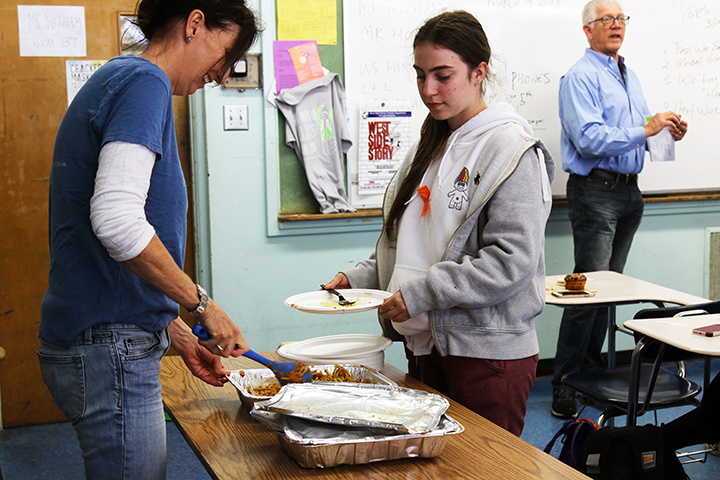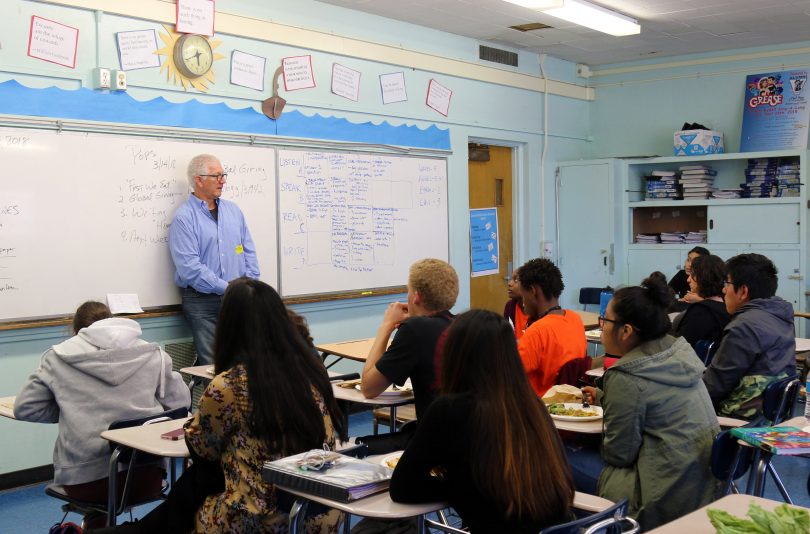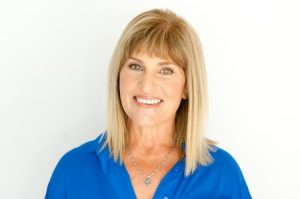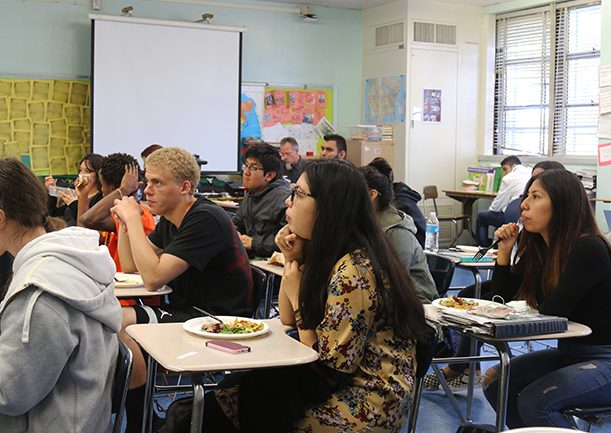POPS the Club: creating a safe space for youth to struggle with the pain of having loved ones behind bars
by Lauren Dunn
It’s lunchtime on a recent Wednesday at Venice High School. Twenty or so students are sitting at their desks with full plates of food looking up at the teacher. No one is looking at their phones. They listen attentively to the man up front, who is giving them a writing prompt.
The man is actually a retired teacher, a 20-plus-year veteran of the Los Angeles Unified School District, who volunteers once a week in this classroom. The students show up weekly to discuss, write, read aloud what they have written and share their thoughts in other ways; not because they have to, but because of their one unique commonality.
They are the sons and daughters, nephews and nieces, grandsons and granddaughters of prison inmates. Of the nearly 2.3 million people in prison in the United States, 52 percent of state inmates and 63 percent of federal inmates are the parents of minor children. Put another way, according to the Bureau of Justice Statistics, 2.3 percent of the U.S. population under 18 have a parent or parents in prison. Those kids, like these students, are left with the shame and stigma of loving someone on the inside.

POPS always provides food as symbolic of breaking bread and breaking down barriers/photo by Lauren Dunn
“POPS the Club,” the Los Angeles-based organization that is sponsoring the noon meeting, works to battle against this stigma and to create a safe space for students with incarcerated family members. POPS, short for “pain of the prison system,” was launched in February 2013 by editor and author Amy Friedman and her husband Dennis Danziger, a novelist, playwright — and the man at the front of the classroom giving the writing prompts and facilitating the open discussions.
POPS started at Venice High and since has spread to eight high schools in the Los Angeles area plus schools on the East Coast and pilot clubs in Harrisburg, Pennsylvania, and Baltimore. Each club aims to create a home and sense of community for students to meet weekly to share a meal and their stories through discussion, writing, art and mindfulness exercises.
It’s personal
Friedman’s ties to the prison system are personal.
More than 25 years ago, she was a newspaper columnist in Kingston, Ontario, Canada, and decided she wanted to learn more about how prisons worked. She started visiting Kingston’s Joyceville Penitentiary with the intention of writing a series of articles about the facility. In the midst of her reporting, something unusual happened. “I wound up falling in love with a man who was in prison, marrying him, and his daughters moved in with me,” she said.
The girls were 3 and 7 years old when their father went to prison. As Friedman got to know them, she was extremely troubled by the shame and emotional burdens her new step-daughters were forced to carry. “It upset me. It infuriated me,” she said. “My experience of being a prisoner’s wife shaped my understanding of how people who love people in prison are treated as if somehow they are a criminal, and that crime is loving someone who is inside.”
Although Friedman and her Canadian husband eventually divorced, his daughters remain in her life. Friedman later remarried (to Danziger) and moved to Los Angeles where, as part of a program sponsored by the L.A. branch of PEN America, she taught creative writing in Danziger’s 10th- and 12th-grade classrooms at Palisades Charter High School and later Venice High School from the fall of 2005 through the spring of 2012.
As Friedman worked with students on their essays, she discovered that an unusual number had family or close friends in prison. But, as she had seen with her step-daughters, they never spoke of it. The couple decided to try to make an impact on this rarely recognized grouping of students.
The couple decided to model their new venture on the template of the LGBTQ school clubs, which had been instrumental in breaking down the stereotypes around being gay or transgender for students. Friedman and Danziger managed to track down the man who wrote the original proposal for such clubs. With his help, they borrowed and refashioned the model, then presented their proposal to launch a new student club to the Venice High School principal, who bought the idea right away, she said.
Shock and awe
Thus, the first POPS was born in February 2013. News spread mainly through word of mouth as Danziger told his classes about the new club and invited students to join the meetings.
Friedman and Danziger based the club on three basic rules. First, no one could be sent to POPS by a counselor, parent or teacher. Members were to attend meetings of their own volition. Second, since the club was scheduled to meet at lunchtime, POPS would always provide food, which they saw as symbolic of breaking bread and breaking down barriers. Third, the club was open to anyone with any sort of connection to incarceration, whether they had a loved one inside or had been locked-up themselves.
After the first POPS meeting, Friedman knew she was on the right path. She tells of watching a 10th-grade girl coming into the meeting room, choosing her peanut butter and jelly sandwich and sitting down. A few minutes later, a second 10th-grade girl walked in. Friedman watched as the two spotted each other from across the room, each visibly stunned by the other’s presence.
The girls had been good friends since kindergarten, but before coming to the POPS meeting, neither knew the other had an incarcerated father. “They’d shared all kinds of things,” Friedman said, “but never shared that.”
She remembers turning to her husband after watching their expressions of shock, then discovery. “We need to bring this to every high school in America,” she told him, then laughed when he rolled his eyes in mock horror at the prospect.
Since that day, expanding POPS has sometimes been an uphill climb, according to Friedman, but the vision of bringing the club to as many U.S. schools as possible remains.
POPS has been the scene of many success stories and positive steps forward for hundreds of young people. One such student is Daniel Ortiz, a young gang member who, in the beginning, talked at meetings of loving his hood and his gang. But as he continued to return to POPS, Ortiz began earning recognition from his classmates, friends and teachers for his writing and reading in class, Danziger said. And when Ortiz found his voice, the space that the gang had once occupied began to be filled by writing and rapping and visions of a different future.
Filling the void
The issues, the stigmatization, the silence faced by these children tied to the prison system can have profound effects on them, Friedman said. The POPS curriculum is specifically designed to disrupt those stigmas and silences. In addition to the writing, mindfulness exercises, and experiments with various art forms, there are guest speakers. Some come to share information about scholarship opportunities and post-graduation programs to jumpstart the students to their next levels of schooling or the professional world. Other visitors, who have done their own time in California state prisons, come to talk about their painful past experiences with insight and eloquence.
Every club is run by a group of volunteers that includes a teacher or school-based sponsor, community-based volunteers and guest speakers. Thus, every club “has its own personality,” Friedman said. Some may lean mostly toward writing exercises, while other clubs may spend a higher percentage of time with talk and personal sharing during the meetings.
Danziger, who is the head volunteer for the Venice High School Club, spent one club meeting in March focused solely on writing. After all the students filled their plates with pasta, salad and rolls, he introduced several writing prompts.
He asked them to step outside their comfort zones and write about something they “typically would never want to write about, talk about or think about.” Finally, he asked the kids to write the name of someone they would trust enough to share this story with.
During the decades he taught high school English, Danziger spent a lot of time helping students write memoirs: “What we do in life is we tell each other stories.”
‘It just opens something up’
The couple sing the same tune, explaining that simply opening the floor for dialogue, providing a welcome place and a safe haven for everyone to gradually tell their hardest stories, has a deep impact on the POPS members.
“Basically, what it really is, is training people on how to create sacred space more than anything,” Friedman said. “It is about making the space safe enough for people to feel that they have a community and to feel that they can talk to each other.”
Over time, Friedman and Danziger realized that some kids were ready to have their stories heard by others outside the POPS world, and that they should be heard. The two began publishing an annual anthology of the students’ writing and artwork. The newest volume was launched Saturday, May 26, complete with a launch party, and like earlier POPS anthologies, it features startlingly moving tales of deep reflection and heartbreak.
“Once these kids are able to write their stories, it just opens something up in them,” Danziger said. “You cannot read this book straight through … you read four or five pages … you’re done and you wipe your eyes.” It is powerful, he said, to give the POPS kids an “opportunity to stop hiding.”
Friedman further illustrated the point with an experience she and Danziger had with a POPS graduate several months ago. The young man had a particularly difficult childhood that included multiple bouts of homelessness. Now he is 20 years old with a good job, she said.
Recently, however, he had to live in his car for a few months. During that time, he told his former mentors, his car was broken into and everything was stolen. He then said he wanted to ask for a favor. Friedman assumed he was going to ask to stay with her family or perhaps borrow some money. The real nature of the favor was entirely different.
“So … when everything was stolen,” he told them, “my POPS anthology was stolen that has my piece in it. I wondered if I could get another one. I wrote that piece and I stood up in front of the room and read it to everybody. That is the reason I’m OK today.”
Such moment convince Friedman and Danziger that POPS must be expanded. Since its inception, she said, the various clubs have affected an estimated 350 to 400 students. The number of POPS volunteers has grown to about 60. Next, in addition to the pilot clubs in Harrisburg, Baltimore, the organization has plans to launch more clubs in, Atlanta and New York City.
In the meantime, at Venice High School, every Wednesday at lunchtime, students who used to feel they had to hide a crucial part of their lives, have found a home and, more importantly, a voice in a club called POPS.
Journalist Lauren Dunn’s story is part of a joint project with WitnessLA and the Juvenile Justice Information Exchange,the University of Southern California Annenberg School for Communication and Journalism




The model of LBGTQ is not working to the degree of real success. What is not reported that many of these prisoners abuse and neglect their children sexually and mentally. How do I know? I have been involved with these kids for over a decade and it’s just plain awful and there’s no two ways about it.
Let’s ask some tough questions:
1. Should a convicted serial killer and sexual abuser of his own children have parental rights?
2. Should children be forced to visit their bio parents?
3. Should the parents be sterilized?
4. Is there any study to prove that anything we do truly is working, long term; except for a few isolated cases?
5. Do the laws favor the abuser more than the child?
6. Should the term “Reunification” be changed to protect the child?
7. Why is there little to no effort in Science, Technology, Electronics or Math with these kids?
All these programs are well intended and should continue only as a part of a much larger and more effective solutions, if we ever get there. Go ahead with the camps and therapy but lets not delude ourselves into thinking this will change the horror of a court system designed ti keep the children behind the 8 ball. We are going the wrong way and have been for decades!
Couple of self promoters trying to make themselves into the next “stand and deliver” screen play. As opportunistic and narcissistic as Danziger clearly is, his crazy wife sounds worse. Should a woman that goes into prisons to meet and marry men be allowed around adolescent kids? Looking forward to see how this mess goes bad.
I recall some years ago, either during the Clinton Administration or the G.W. Bush Administration, the White House was involved in promoting the concept that every child is inherently entitled to have a mother and father. That the child has a right to accrue the beneficial aspects of a relationship with parents.
In the instance of a child whose parent is incarcerated, there is an increased probability the child is burdened by negative aspects arising from the relationship.
The child may have suffered active abuse by the parent, and the abusive tendencies may be directly or peripherally related to the circumstances which led to incarceration of that parent.
The child can also become subjected to negative aspects as the passive result from a parent imprisoned. Extreme neglect or complete abandonment of the child is often a de facto consequence when a parent ends up behind bars.
And there are issues which the POPS program was created to address – such as social stigmatization awaiting with its unfounded assumption that having a parent in prison is indicative that some defect has carried to the offspring.
Everything written above now stated, the original premise remains operative – the child has an essential right to accrue the beneficial aspects of a relationship with parents.
It should become the foundational premise that informs the official policies and practices going forward, which includes children with a parent(s) in prison.
The State, acting in the name of The People, via the process of the criminal Justice System, may place severe limitations on exercising freedom of movement of a duly convicted individual.
The State must also recognize the rights of the child.
Whenever and however possible, the State should act to accomodate the rights of the child and should permit the exercise of parental duties and responsibilities from within the prison confines.
The technology available today presents significant opportunity.
Opportunity for the child to access and accrue beneficial aspects available from relationship with the parent in prison.
Opportunity to engage in guided therapies to promote healing and recovery from damage related to abusive/dysfunctional parent/child relationship.
Opportunity to engage in communication/healthy relating on a reliable and regular schedule so the parent/child relationship can become stabilized, thus preparing for successful continuation upon release from prison.
Venice High School is exactly the right type of place to get this started, if it hasn’t already begun.
The public schools of urban Los Angeles which draw enrollment from a low income and very low income demographic is probably where we’ll find the highest concentration of students with a parent in prison.
That is where to bring the bus.
The bus would be custom equipped to conduct private video conference sessions utilizing high bandwidth audio/video transmission to replicate the intimacy needed for complete and nuanced personal dialogue.
Trained counselor/caseworkers would monitor and facilitate the child/incarcerated parent communication sessions.
The programming would draw on affiliations to CA State Colleges and University resources involved in sociology/psychological therapy specializations.
The child’s regular school teachers would also participate to conduct incarcerated parent/teacher conferences and whenever their help is required to keep the incarcerated parent abreast of the child’s assigned coursework, activities and progress.
The program also requires dedicated facilities at California prison institutions or mobilized facilities which can park inside the grounds, plug in and receive the cooperation needed to ensure that prisoners are on-time and ready to participate in the scheduled parent/child video-conference session.
Maj. Kong, where does it say, “she goes into prisons to meet and marry men?” Is your reading comprehension so bad or are you in the police-report writing mindset where you twist the facts to fit your narrative. I do not know if the program helps the kids, but at least they are trying to do something productive for these kids. It would take a randomized study with a control group to really asses the merits of the program. And, no, that is not what you did by randomly pulling shit out of your ass.
And, you are “looking forward to see how this mess goes bad?” Where I come from we call people like you Haters. You are an angry, pot-bellied bitter white man who longs for the days of old, one who would be happier pretending to be a cowboy surrounded steers instead of queers. They have been at it since 2013, it says. At what point do you issue your verdict on where the project works?
Finally, I would allow my kids to be around these folks before I let join your Cadet program where kids get diddled and rapped. Are you calling for the end of that program? We should. Like that scared straight and DARE propaganda crap that you and your ilk support and which has been shown to be useless. Take care my angry friend.
Kids are sometimes used by people into doing their bidding. SJW’s love doing this. “Hey Joey your daddy is in prison for beating the shit out of your mommy but you need to remember, he is your daddy and we’re going to help you connect with him.”
The majority of the parents I’ve locked up that went to state prisons didn’t care about their kids. They were selfish, useless dregs who had other relatives raising them because of their lack of self control. All they ever did was make excuses and I always loved it when competent family members stepped up and became a positive influence for a child whose parents were’nt. Sadly, too many, didn’t have anyone. Incarcerated parents need to of course show signs of rehab first before kids should be visiting them, they are cons, to make state takes an effort, a willingness to be a really bad guy. Let’s not forget that and not use kids because of own thoughts of it’s the right thing to do. I speak from experience.
Silly little cf, read the story again sweetheart, see if you can find the part where the crazy lady marries the jail bird. BTW I don’t have a “cadet” program, so….Your time spent in pan African,Chicano gender studies class isn’t serving you very well.
This does not happen in real life. Maybe in La La Land but not here!
Maj Kong, I did read it. It said, “She started visiting Kingston’s Joyceville Penitentiary with the intention of writing a series of articles about the facility. In the midst of her reporting, something unusual happened.” She then married. What you said was a Trumpian interpretation. You said she was “a woman that goes into prisons to meet and marry men.” Do you really believe she goes to prisons to meet men and marry men? Could you be that ignorant.
That sounds like something a Sheriff’s Deputy would do, go to prison to meet women. How many of your ilk have been accused and charged with sexually assaulting female inmates. My god, can you really not impress women with that little badge and big gun that you have to assault inmates and little cadets.
Cf- “In the mists of her reporting something unusual happened, then she married” priceless, absolutely priceless, little girl you have a lot to learn.
Oddly enough, there are some people who do better within the structured prison environment. Even some who truly thrive.
I have a buddy who has been in and out, rinse and repeat.
On the outside, there is the freedom to pair up with dysfunctional partners and live out a chaotic, tumultous and financially devastating cohabitation.
There is the opportunity for the temptation of casinos to lure a person beyond reasonable self-control. There is no limit to the cartons of cigarettes, cases of beer, cartons of soda-pop and crates of hot-dogs and cheeseburgers one may legally consume. No limit to the charlatans and posers proposing too-good-to-be-true schemes and scams that pan out into nothing but trouble.
When my buddy was released 2 years ago, he came home in good shape.
He was trim and energetic.
He had worked as a cook in the prison kitchen. The predictable work routine provided a sense of purpose. His kitchen position allows for him to ladle out a larger serving or a bigger baked potatoe to someone who achnowledges the favor. So the job carries a little bit of status and boosts the self-esteem.
He was seen by the prison medical staff, provided prescription medication for his conditions. His medical file is under one roof and symptoms are stabilized and monitored.
He read a lot of books in prison. I never knew he was such a big fan of science fiction literature.
2 years after getting out of prison, he looks terrible.
Probably gained 80 lbs.
Diabetes raging out of control.
Crazy broads he needs to run and rescue.
Monthly benefit check is cashed, then buy Scratchers, then pay bills.
He is a good guy. U.S. army veteran of vietnam war.
I don’t have much opportunity to see my friend if he goes to prison.
But i honestly believe he will live longer if he goes back.
Nicely said Marlin, I frequent quite a few casino, play a lot of cash poker. Most types I see like this I see at Hollywood Park. Haven’t been there in a while, just not a great place to play. Hope your friend does better.
[…] View Reddit by Whey-Men – View Source […]